
Korean Chemical Engineering Research
Scope & Guideline
Unveiling Emerging Research in Chemical Engineering
Introduction
Aims and Scopes
- Catalysis and Reaction Engineering:
Research on the design, synthesis, and characterization of catalysts for various chemical reactions, including ammonia synthesis, hydrogen production, and waste valorization. - Materials Science and Nanotechnology:
Exploration of advanced materials such as nanocomposites, carbon-based materials, and polymers, particularly in applications related to batteries, membranes, and sensors. - Environmental Engineering and Sustainability:
Focus on processes and technologies for pollution control, waste treatment, and resource recovery, including CO2 capture and bioenergy production. - Energy Systems and Renewable Energy:
Investigation of chemical processes and systems for energy conversion, including fuel cells, hydrogen production, and biomass utilization. - Computational Modeling and Data Science:
Application of computational methods, machine learning, and artificial intelligence to model chemical processes and optimize performance.
Trending and Emerging
- Sustainable Chemical Engineering:
An increasing number of studies focus on sustainable practices, including waste plastic upcycling, biomass utilization, and carbon neutrality assessments. - Advanced Materials for Energy Applications:
Research on novel materials such as carbon nanotubes, graphene, and nanocomposites for applications in batteries, fuel cells, and sensors is on the rise. - Artificial Intelligence and Data-Driven Approaches:
The integration of AI techniques in chemical process design and analysis is becoming a significant theme, enhancing predictive capabilities and process optimization. - Electrochemical Technologies:
There is a growing interest in electrochemical methods for energy conversion and storage, including advancements in fuel cells and batteries. - Environmental Remediation Technologies:
Emerging studies emphasize innovative methods for the removal of pollutants from water and air, showcasing the journal's commitment to addressing environmental challenges.
Declining or Waning
- Traditional Chemical Processes:
There is a noticeable decrease in publications focused on conventional chemical engineering processes, as the field shifts towards more innovative and sustainable methods. - Basic Chemical Education:
Research related to foundational chemical education topics appears to be waning, potentially overshadowed by more applied and interdisciplinary studies. - Non-renewable Energy Sources:
Themes around fossil fuel-based processes and technologies are becoming less common, indicating a shift towards cleaner and more sustainable energy alternatives.
Similar Journals
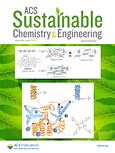
ACS Sustainable Chemistry & Engineering
Pioneering research for a greener tomorrow.ACS Sustainable Chemistry & Engineering is a premier journal published by the American Chemical Society, dedicated to advancing knowledge and innovation in the fields of sustainable chemistry and engineering. With an impressive impact factor and a consistent ranking in the Q1 category across various disciplines such as Chemical Engineering, Chemistry, Environmental Chemistry, and Renewable Energy, this journal serves as a vital resource for researchers, professionals, and students alike. Since its inception in 2013, the journal has been committed to publishing high-quality, peer-reviewed articles that address the critical challenges of sustainability in chemistry and engineering. With no open-access option currently available, the journal emphasizes the importance of premium scholarly communication. As the field continues to evolve, ACS Sustainable Chemistry & Engineering remains at the forefront of providing cutting-edge research that impacts our understanding and application of sustainable practices in the chemical sciences.

Green Chemical Engineering
Advancing sustainable solutions for a greener tomorrow.Green Chemical Engineering, an esteemed journal published by KEAI PUBLISHING LTD, plays a pivotal role in advancing the field of sustainable chemical engineering. With an Open Access policy since 2020, this journal facilitates the free exchange of cutting-edge research and innovations that address critical environmental challenges. Based in China, it has rapidly gained recognition with impressive category quartiles, ranking Q1 in numerous relevant fields including Catalysis, Chemical Engineering (miscellaneous), Filtration and Separation, and Process Chemistry and Technology. Its presence in Scopus highlights its significance, with top rankings (e.g., Rank #4/19 in Filtration and Separation) placing it in the upper echelons of chemical engineering literature. Designed for researchers, professionals, and students alike, Green Chemical Engineering aims to foster a collaborative platform for the dissemination of pioneering work that contributes to a greener and more sustainable future.
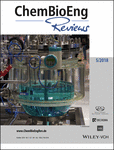
ChemBioEng Reviews
Pioneering Insights in Bioengineering and Chemical EngineeringChemBioEng Reviews is a premier academic journal dedicated to advancing the fields of biochemistry, bioengineering, and chemical engineering. Published by WILEY-V C H VERLAG GMBH, this journal serves as an essential platform for researchers and professionals seeking to disseminate groundbreaking insights and innovations. With a remarkable impact factor and a solid reputation, it is ranked in the top quartile (Q1) across multiple disciplines, including Biochemistry, Bioengineering, and Industrial and Manufacturing Engineering. The journal's comprehensive scope covers the synthesis, analysis, and application of bioengineered solutions, making it a vital resource for anyone involved in process chemistry and technology. With an unwavering commitment to high-quality scientific discourse from 2014 to 2024, ChemBioEng Reviews is not only pivotal for the academic community but also contributes to industry advancements in filtration, separation processes, and the intersection of chemical and biological engineering.
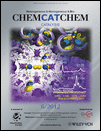
ChemCatChem
Transforming Ideas into Breakthroughs in Chemistry.ChemCatChem is a leading international journal published by WILEY-V C H VERLAG GMBH that has been making significant contributions to the fields of catalysis, inorganic and organic chemistry, as well as physical and theoretical chemistry since its inception in 2009. With an established reputation for excellence, this journal holds commendable rankings in various categories, including Q1 in Inorganic Chemistry and Q1 in Organic Chemistry, demonstrating its pivotal role in advancing scientific knowledge and innovation. Notably, it has achieved a high Scopus ranking, securing 10th place out of 79 in Inorganic Chemistry, among others, showcasing its influence and quality. Although open access options are not available, the journal offers cutting-edge research articles, reviews, and insights that are vital for researchers, professionals, and students aiming to stay at the forefront of chemical science. With its address rooted in Weinheim, Germany, and convergence projected to continue until 2024, ChemCatChem remains a dynamic platform for disseminating vital advancements within the chemical community.
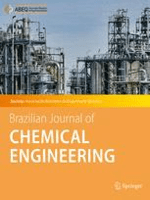
BRAZILIAN JOURNAL OF CHEMICAL ENGINEERING
Fostering Collaboration in Chemical Engineering ExcellenceThe Brazilian Journal of Chemical Engineering (ISSN: 0104-6632, E-ISSN: 1678-4383), published by Springer Heidelberg, stands as a prominent open-access journal dedicated to disseminating innovative research and advancements in chemical engineering since its inception in 1997. With a commitment to enhancing knowledge exchange within the field, this journal is indexed in Scopus, earning a respectable Q3 rank in the category of General Chemical Engineering as of 2023. It provides a platform for researchers, professionals, and students to explore a diverse range of topics, fostering collaboration and innovation from its base in Brazil. The journal has converged its operations from 1995 and will continue to push the boundaries of chemical engineering research until 2024 and beyond. As a critical resource for up-to-date methodologies and emerging trends, the Brazilian Journal of Chemical Engineering is essential for those aiming to make impactful contributions in this dynamic and evolving field.

Journal of the Pakistan Institute of Chemical Engineers
Empowering Chemical Engineers through Rigorous Research and Review.The Journal of the Pakistan Institute of Chemical Engineers serves as a pivotal platform for advancing the field of chemical engineering within Pakistan and beyond. Published by the Pakistan Institute of Chemical Engineers, this journal aims to disseminate high-quality research, reviews, and case studies that cover a wide scope of topics relevant to chemical engineering, including process design, environmental technology, and materials science. Although it operates under a non-open access model, the journal is committed to maintaining rigorous peer-review standards to ensure the publication of impactful articles that contribute to the advancement of knowledge and best practices in the discipline. As a hub for researchers, professionals, and students alike, this journal not only fosters academic collaboration but also plays an integral role in shaping the future of chemical engineering in the region. With an ISSN of 1813-4092, it is dedicated to enhancing the visibility and accessibility of chemical engineering research, promoting innovation and education within the field.
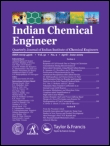
Indian Chemical Engineer
Transforming Ideas into Chemical Engineering Solutions.Indian Chemical Engineer, published by Taylor & Francis Ltd, stands as a reputable journal in the field of chemical engineering, encompassing a wide range of topics pertinent to both academia and industry. With an ISSN of 0019-4506 and an E-ISSN of 0975-007X, this journal has been a key resource for researchers and professionals since its inception in 1992, undergoing a significant evolution from 2009 to 2024. Currently ranked in the Q3 category of chemical engineering (miscellaneous) in 2023, it reflects a dedicated commitment to disseminating innovative research and insights within the discipline. The journal is indexed in Scopus, achieving a rank of 148 out of 273, which denotes its growing influence in the field with a 45th percentile placement. Although currently not an open-access publication, it offers valuable content that contributes extensively to the advancement of chemical engineering research and education. Researchers, professionals, and students alike are encouraged to engage with this publication to stay at the forefront of industry advancements and academic discussions.
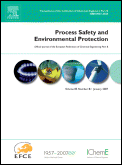
PROCESS SAFETY AND ENVIRONMENTAL PROTECTION
Pioneering research that protects our planet and its people.PROCESS SAFETY AND ENVIRONMENTAL PROTECTION, published by Elsevier, is a premier academic journal dedicated to advancing the fields of chemical engineering, environmental science, and safety management. With an impressive impact factor, this esteemed journal undergoes a meticulous peer-review process and serves as a vital platform for researchers, professionals, and students seeking to disseminate cutting-edge research and innovative practices. Submissions are welcome in a wide scope of topics related to safety, risk, reliability, and environmental engineering, demonstrating its influence as a Q1 journal across multiple categories, including Environmental Chemistry and Safety, Risk, Reliability and Quality. By providing a rigorous analysis of current challenges and solutions in the domain since its inception in 1990, it continues to foster interdisciplinary collaboration and practical applications in the United Kingdom and beyond. With the journal not currently offering Open Access options, subscribers gain exclusive access to pivotal insights that shape industry standards and drive advancements in sustainable practices.

KOREAN JOURNAL OF CHEMICAL ENGINEERING
Connecting Ideas, Inspiring Solutions in Chemical Engineering.The Korean Journal of Chemical Engineering is a prestigious publication by the Korean Institute of Chemical Engineers, dedicated to advancing the field of chemical engineering and its associated sciences. Established in 1984, this journal has made significant contributions to the dissemination of innovative research, covering a broad spectrum of topics within chemical engineering and general chemistry. With a current impact factor placing it in the Q2 quartile within both the chemical engineering and chemistry categories, it is recognized for its rigorous peer-review process and high-quality articles. The journal provides a valuable platform for researchers, professionals, and students to share their findings and collaborate on emerging methodologies and technologies. Although it does not offer open access options, its broad international readership, bolstered by its Scopus rankings — including a commendable #108 in general chemical engineering — ensures widespread visibility and dissemination of published works. As it approaches its 40th anniversary in 2024, the Korean Journal of Chemical Engineering continues to be an essential resource for anyone engaged in the field, driving innovation and academic dialogue worldwide.

Revista Mexicana de Ingenieria Quimica
Innovative Insights for a Sustainable FutureRevista Mexicana de Ingenieria Quimica, published by UNIV AUTONOMA METROPOLITANA-IZTAPALAPA, serves as a vital academic platform for the dissemination of innovative research in the field of chemical engineering. Established in 2008, this journal has become a respected source of knowledge, reflecting the ongoing advancements and challenges in the discipline. As a Q3 ranked journal in the field of Chemical Engineering, it holds a significant position with a meaningful impact amongst its peers, showcasing diverse aspects of chemical engineering and applications. With contributions from various scholars, it actively engages the global research community and promotes collaboration among professionals and students alike. While currently not designated as an open-access publication, the journal is accessible through institutional subscriptions, ensuring that valuable insights and findings reach a broad audience. Researchers looking to stay at the forefront of chemical engineering would benefit immensely from the cutting-edge studies and reviews published in Revista Mexicana de Ingenieria Quimica.